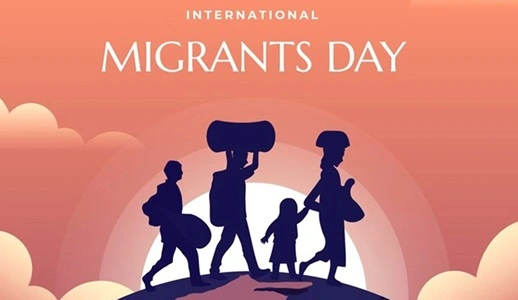International Migrants Day, observed annually on December 18, is a global occasion established by the United Nations to recognize the contributions of migrants to societies worldwide and to highlight the challenges they face. This day serves as a reminder of the importance of protecting the rights of migrants and fostering a world where migration is safe, orderly, and dignified.
With over 281 million international migrants globally in 2020, migration is a significant phenomenon shaping economies, cultures, and communities. International Migrants Day celebrates the resilience and determination of those who leave their homes in search of better opportunities while addressing the need for inclusive policies that uphold their dignity and rights.
History and Origins

The United Nations proclaimed December 18 as International Migrants Day in 2000, marking the anniversary of the adoption of the International Convention on the Protection of the Rights of All Migrant Workers and Members of Their Families in 1990. This convention, a landmark document, emphasizes the rights and protections of migrant workers and their families, regardless of their migration status.
The day highlights the shared responsibility of nations to create humane migration policies that prioritize the well-being of migrants and promote international cooperation.
Why Migration Matters
Migration is a complex and multifaceted phenomenon that significantly impacts individuals, families, and nations. Here are some key reasons why migration matters:
1. Economic Growth
Migrants contribute to economies by filling labor shortages, driving innovation, and creating businesses. Their remittances—funds sent back to families in their home countries—are a vital source of income for millions and support national economies.
2. Cultural Exchange
Migration fosters diversity and enriches societies by bringing together people from different cultural, linguistic, and religious backgrounds. This exchange promotes mutual understanding and tolerance.
3. Addressing Demographic Challenges
Many countries with aging populations rely on migrants to sustain their labor forces and support social welfare systems.
Challenges Faced by Migrants
Despite their contributions, migrants often encounter significant challenges, including:
1. Discrimination and Xenophobia
Migrants frequently face prejudice and social exclusion, which hinder their integration into host communities.
2. Exploitation
Migrant workers are vulnerable to exploitation, including low wages, poor working conditions, and lack of legal protection.
3. Irregular Migration
Migrants who travel without proper documentation often face unsafe journeys, human trafficking, and detention.
4. Lack of Access to Services
Many migrants struggle to access healthcare, education, and social services, particularly in countries with restrictive policies.
5. Family Separation
Migration often results in families being separated, causing emotional and psychological stress for those involved.
Themes of International Migrants Day
Each year, International Migrants Day focuses on a specific theme to highlight critical aspects of migration. Recent themes include:
- 2022: “Harnessing the Potential of Human Mobility” – Emphasizing how migration contributes to global development.
- 2021: “Reimagining Human Mobility” – Highlighting the need for innovative and inclusive approaches to migration in a post-pandemic world.
These themes guide discussions, campaigns, and initiatives aimed at promoting awareness and action.
Global Efforts to Support Migrants
International Migrants Day aligns with global initiatives and frameworks aimed at ensuring the protection and empowerment of migrants:
1. Global Compact for Migration
Adopted in 2018, the Global Compact for Safe, Orderly, and Regular Migration is the first intergovernmental agreement that addresses all dimensions of international migration. It outlines 23 objectives to improve migration governance and protect migrants’ rights.
2. Sustainable Development Goals (SDGs)
Migration is closely linked to several SDGs, including:
- Goal 8: Decent work and economic growth.
- Goal 10: Reduced inequalities, with a specific target on facilitating safe migration.
- Goal 16: Promoting peace, justice, and strong institutions.
3. International Organization for Migration (IOM)
As the leading agency on migration, the IOM works to ensure humane and orderly migration, provide assistance to migrants, and promote international cooperation.
How International Migrants Day is Observed
International Migrants Day is marked by activities worldwide to celebrate migrants’ contributions and advocate for their rights. These include:
- Educational Campaigns Governments, NGOs, and communities organize workshops, seminars, and public discussions to raise awareness about migration and its impact.
- Cultural Events Festivals, art exhibits, and performances showcase the cultural diversity brought by migrants, fostering inclusion and mutual understanding.
- Policy Dialogues Forums and conferences engage policymakers, academics, and civil society in discussions about migration governance and best practices.
- Media Outreach Social media campaigns, documentaries, and public service announcements amplify migrants’ stories and highlight their challenges and achievements.
How You Can Support Migrants
As individuals, there are many ways to support migrants and contribute to a more inclusive society:
- Raise Awareness Share accurate information about migration to combat myths and stereotypes.
- Advocate for Inclusive Policies Support policies that protect migrants’ rights and promote their integration into host communities.
- Volunteer Offer your time and skills to organizations that assist migrants, such as language tutoring or legal aid.
- Celebrate Diversity Participate in cultural events that highlight the contributions of migrants to society.
Looking Ahead: A World that Embraces Migration
Migration has been a driving force of human progress for centuries. As we navigate a rapidly changing world, the need for humane and effective migration policies becomes even more critical. Climate change, political instability, and economic disparities are likely to increase migration pressures, making international cooperation essential.
By recognizing the rights and contributions of migrants, we can build a more inclusive, equitable, and prosperous future for all.
Conclusion
International Migrants Day is an opportunity to celebrate the resilience and contributions of migrants while addressing the challenges they face. It reminds us of our shared responsibility to ensure migration is safe, dignified, and beneficial for everyone. As we commemorate this day, let us reaffirm our commitment to protecting migrants’ rights and fostering a world where everyone, regardless of their origin, can thrive. Together, we can turn migration into a force for good, enriching societies and promoting sustainable development for generations to come.

